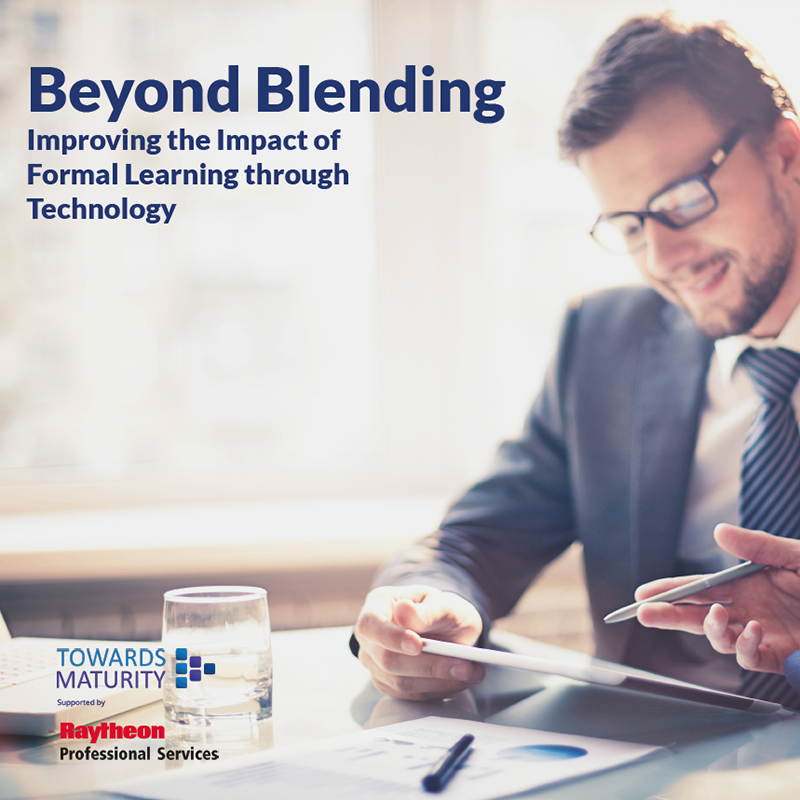
Brand new research on the importance of Blended Learning
New research finds 54% of learning is still being conducted solely in the classroom – but change is needed for formal learning to remain effective.
Towards Maturity delve deeper into the dichotomy L&D are facing between formal learning and the desire for increased accessibility and availability. Supported by ambassadors, Raytheon Professional Services, this brand new In Focus report uncovers new insight into the most effective ways to improve formal learning by exploring what successful organisations are doing differently.
Beyond Blending: Improving the Impact of Formal Learning through Technology draws on responses from over 700 learning professionals, more than 10,000 learners and verbal contributions from L&D professionals around Europe who participated in Raytheon’s symposiums in London and Munich in September 2018.
Face to face learning will only continue to have an impact if it adapts. This report explores how organisations that improve their formal learning are doing blended learning well by integrating technology into the very fabric of their formal learning design. Further to simply suggesting a ‘blended’ approach, the report looks at how L&D can embrace technology as a supplement to classroom learning in a way that helps improve choice, increase learning transfer, encourages engagement and establishes insight.
Data from these successful organisations shows that 53% blend their use of several different learning approaches compared to 27% of other companies. 40% integrate learning technologies in their face to face learning (compared with 19%) and 44% give learners the opportunity to learn in places convenient to them (compared with 26%).
Molly Blackwell, Research Analyst at Towards Maturity and author of this report explains, “L&D professionals are aware of blended learning, it is not a new concept. What is lacking is the understanding of how to embrace technology into the very structure of their learning strategy. This report provides an in-depth analysis into the best ways for organisations to improve the effectiveness of formal learning by doing just that.”
“The right learning strategy is never about merely just adding new media or new technology, but rather using technology as an enabler to support the different cycles of learning”, adds Mark Oliver, Managing Director of Raytheon Professional Services. “This in dept report, which shares many practical insights, is an excellent source for revisiting areas of improvement, and defining future requirements.”
Classroom courses are undeniably valuable, but in order to maintain its worth in an ever-evolving society, it needs to have the capability to adapt to the changing demands of the contemporary learner.
Download the full In Focus report, Beyond Blending: Improving the Impact of Formal Learning through Technology from the Towards Maturity website today, available thanks to the support of ambassadors Raytheon Professional Services: www.towardsmaturity.org/beyond-blending
ENDS
About Raytheon Professional Services
Raytheon Professional Services (RPS) is a global leader in providing training and learning services. For more than 90 years, in 146 countries and 34 languages, RPS has helped organisations transform the way they provide training and learning across their enterprise. Through the design, development, administration and delivery of performance-driven training and learning solutions, ranging from innovative classroom training, e-Learning, mobile learning and virtual classroom training, ensures employees, customers, suppliers, franchises and other partners are all aligned.
Our global footprint and scale make us unique among learning solutions providers, and enables us to rapidly deploy established tools, processes and experience for our clients to accelerate the success of their training programmes. By determining what element or elements of the training value stream need to be addressed, a considered blended learning solution is always delivered to meet an organisation’s unique challenges, goals and objectives.


